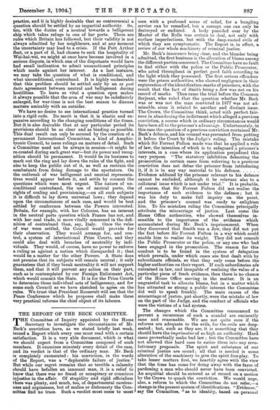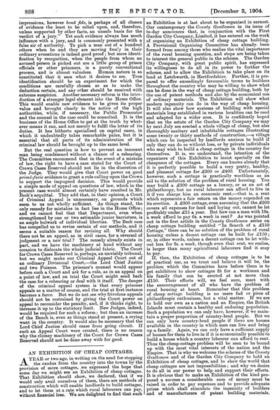T HE Committee of Inquiry appointed by the Home Secretary to
investigate the circumstances of Mr. Beck's conviction have, as we stated briefly last week, issued a Report which every one must read with a certain satisfaction. It is a very able document, which is what we should expect from a Committee composed of such members. It examines minutely every detail of the case, and its verdict is that of the ordinary man. Mr. Beck is completely exonerated : his conviction, in the words of the Report, was a "deplorable failure of justice." But while our regret remains that so terrible a calamity should have befallen an innocent man, it is a relief to know that there was no fraud or conspiracy or conscious injustice in the affair. Of stupidity and rigid officialism there was plenty, and much, too, of departmental careless- ness and supineness, but of malice or dishonesty the Com- mittee find no trace. Such a verdict must come to most men with a profound sense of relief, for a bungling service can be remedied, but a corrupt one can only be destroyed or endured. A body presided over by the Master of the Rolls was certain to deal, not only with surface imperfections, but with the deep-rooted evils of which they are symptomatic. The Report is, in effect, a review of our whole machinery of criminal justice.
Mr. Beck's innocence being clear, and the blunder being admitted, the first business is the allocation of blame among the different parties concerned. The Committee have no fault to find either with the police or the Public Prosecutor; who acted throughout in perfect good faith according to the light which they possessed. The first serious offenders were the prison authorities, who showed negligence in their registration of the identification-marks of prisoners, with the result that the fact of Smith being a Jew was not on his record of marks. Then came the trial before the Common Serjeant, who ruled that the question whether Mr. Beck was or was not the man convicted in 1877 was not ad- missible, since it related, to another and distinct issue. The Crown, the Committee think, acted with perfect fair- ness in abandoning the indictment which alleged a previous conviction, a course which in ordinary circumstances would have been all to the prisoner's advantage. Unfortunately, in this case the question of a previous conviction contained Mr. Beck's defence, and his counsel was prevented from putting it before the Court by the Judge's ruling. The mistake which Sir Forrest Fulton made was that he applied a rule of law, the intention of which is to safeguard a prisoner's interests, in a case where its application prejudiced this very purpose. "The statutory inhibition debarring the prosecution in certain cases from referring to a previous conviction does not debar the prisoner from introducing it, if it is in any way material to his defence Evidence adduced by the prisoner relevant to his defence cannot be excluded, although it be relevant also to a collateral issue which is not under trial." It is probable, of course, that Sir Forrest Fulton did not realise the importance of such evidence to the defence ; but it was his duty to make full inquiry on the point, and the prisoner's counsel was ready to enlighten him. To his mistaken ruling the Committee principally attribute the miscarriage of justice. Last come the Home Office authorities, who showed themselves in- sensible to the importance of the evidence which accumulated during Mr. Beck's imprisonment. When they discovered that Smith was a Jew, they did not put the fact before Sir Forrest Fulton in a way which could enable him to realise its weight. They did. not consult the Public Prosecutor or the police, or any ene who had been engaged in the prosecution. The reason for this conduct is to be found in the system of delegation which prevails, under which cases are first dealt with by subordinate officials, so that they only come before the higher authorities on their report. If such subordinates are untrained in law, and. incapable of realising the value of a particular piece of fresh evidence, then there is no chance of the Home Office moving in the matter. It is an ungrateful task to allocate blame, but in a matter which has attracted so strong a public interest the Committee did well to speak frankly. The main causes of the miscarriage of Justice, put shortly, were the mistake of law on the part of the Judge, and the conduct of officials who were the victims of a bad system.
The changes which the Committee recommend to prevent a recurrence of such a scandal are eminently sane and reasonable. We are not quite sure if the reforms are adequate to the evils, for the evils are deep- seated ; but, such as they are, it is something that they should have the imprimatur of so high an authority. Hard cases proverbially make bad law ; but the Committee have not allowed this hard case to entice them into any revo- lutionary proposals. The spirit and substance of our criminal justice are sound; all that is needed is some alteration of the machinery to give the spirit free play. To take lesser matters first, we heartily agree with the view that the time has come for doing away with the farce of pardoning a man who should never have been convicted. An acquittal should be entered as of record on a motion by the Crown to quash the conviction. We would urge, also, a reform to which the Committee do not refer,—a, change in the present system of identifications. "Evidence," say the Committee, "as to ' identity, based on personal impressions, however bond fide, is perhaps of all classes of evidence the least to be relied upon, and, therefore, unless supported by other facts, an unsafe basis for the verdict of a jury." Yet such evidence always has much influence with a, jury, and is commonly presented. with a false air of authority. To pick a man out of a hundred others when he and they are moving freey in their ordinary avocations is indeed good proof ; but mere identi- fication by recognition, when the people from whom an accused person is picked out are a little group of prison officials or other prisoners, is a purely conventional process, and is almost valueless. Human nature is so constituted that it sees what it desires to see. True identification should be an experiment for which the conditions are carefully chosen so as to make the deduction certain, and any other should be received with extreme suspicion. Another necessary reform is the intro- duction of a stronger legal element into the Home Office. This would enable new evidence to be given its proper value and brought clearly to the notice of the high authorities, while, if necessary, the Public Prosecutor and the counsel in the case could be consulted. It is the business of the Home Office to get at the truth by what- ever means it can, and not merely to fulfil the letter of its duties. It has hitherto specialised on capital cases, in which it undoubtedly takes remarkable pains, but it is essential that all parts of its administration of the criminal law should be brought up to the same level.
But the real question is how to prevent an innocent man being condemned without a chance of a rehearing. The Committee recommend that in the event of a mistake of law, the right to have a case stated for the Court of Crown Cases Reserved should not lie in the discretion of the Judge. They would give that Court power on good prima-fade evidence to grant a rule calling upon the Crown to support the impugned decision. This would provide a simple mode of appeal on questions of law, which in the present case would almost certainly have resulted in Mr. Beck's acquittal. They add that, in their opinion, a Court of Criminal Appeal is unnecessary, on grounds which seem to us not wholly sufficient. As things stand, the only remedy for mistakes in fact lies in the Home Office ; and we cannot feel that that Department, even when strengthened by one or two estimable junior barristers, is an ample bulwark of individual liberties. The Beck case has compelled us to revise certain of our methods, and it seems a suitable reason for revising all. Why should there not be an appeal, as in civil cases, for a reversal of judgment or a new trial ? The remedy already exists in part, and we have the machinery at hand without any occasion to dislocate the whole judicial fabric. The Court for Crown Cases Reserved is, perhaps, an unwieldy tribunal, but we might make our Criminal Appeal Court out of an ordinary Divisional Court,—the Lord Chief Justice and two Puisnes. The prisoner's counsel would appear before such a Court and ask for a rule, as in an appeal on a point of law, and on trial the Court might send back the case for a rehearing or deal with it itself. The danger of the criminal appeal system is that every prisoner appeals as a matter of course, and the trial at first instance becomes a farce. But we do not see why frivolous appeals should not be restrained by giving the Court power on appeal to reconsider the penalty, and, if it thinks right, to increase it up to the statutory limit. New Judges, indeed, would be required for such a reform ; but then an increase of the Bench is, even as things stand at present, a crying want in the country. It would also be necessary that the Lord Chief Justice should cease from going circuit. If such an Appeal Court were created, there is no reason why the clumsy machinery of the Court for Crown Cases Reserved should not be done away with for good.
AN EXHIBITION OF CHEAP COTTAGES. to pay.







































































 Previous page
Previous page